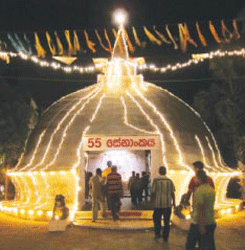
Vesak
Vesak is a modern Buddhist festival, founded in 1950 and celebrated by Buddhist countries throughout the region. In Sri Lanka the celebration is centered around the display of lights and lanterns at home and more elaborate, sponsored displays in the streets. Crowds flock to Colombo and major cities, crowding in vans and lorries to see the displays at night.
This year marked the first time that Vesak was celebrated in Jaffna. “After 30 years of violence, after liberation, the Army organised Yapa Patunai Daham Amawai for the benefit of all civilians,” said Major General Samarasinghe. “Tamil people also participated. We received over 200,000 people per day. People from down south came, it was like a reunion.”
Appearances
These peaceful celebrations, however, have a symbolic import beyond a simple festival. The main event took place near the Jaffna Public Library. That building, now aglow with lights, was set on fire in 1981, reportedly by police and paramilitary. That blaze destroyed over 97,000 volumes of priceless literature and remains a sore spot for Sri Lankans around the world. In a 2006 speech President Mahinda Rajapaksa said “burning the Library sacred to the people of Jaffna was similar to shooting down Lord Buddha.”
In this shadow, the Sri Lankan military chose to sponsor a Vesak celebration, attended by hundreds of thousands, including over 30,000 from out of town. There was no violence, this was ensured by armed guards posted, at times, every five meters around the display grounds. The displays themselves were assembled by various Army divisions, surely a welcome respite from the works of war.
Sensitivity
During the festival, Buddhist flags adorned every checkpoint and lights and flags fluttered in front of every government and military building. Average homes, however, were dark. “I don’t think there is a single Tamil Buddhist in the North,” said MP Premachandran.
Even the former LTTE capital of Kilinochchi, however, was decorated for Vesak. The most dominant landmark in that town — besides the fallen water tower — is now a Buddhist temple. All of this leads to fear of southern encroachment on the culture and identity of the North. At the same time, the military bulldozed LTTE monuments like the cemetery at Chaaty Beach, near Jaffna.
A trishaw driver who wished to remain anonymous said that this wasn’t right. He said that many people on the peninsula had supported the LTTE, but didn’t go on. The site has been razed to rubble. Tourists swim nearby.
Parity
In this backdrop the military sponsorship of Vesak could be seen as communal triumphalism. As a sort of rubbing it in. The military, despite being composed of all races and creeds, remains a primarily Sinhala body. Celebrations remained centered around government establishments and military camps, attended by visitors from the south.
“The Army is non-religious,” said Major General Samarasinghe. He said that the forces would contribute to any requirement and that they assisted in this Vesak because “this is a Buddhist country.” He also added that the Army had been vital in supporting the Nallur Kovil festival in Jaffna and repairing the Madhu Church near Mannar.
When asked whether the Army would extend Vesak-level support to any Hindu festival, however, MP Premachandran said “They will not, never ever.”
Street View
Many Tamil people in Jaffna, however, seem ambivalent when asked about the celebrations. ”We enjoyed,” said one student at the University of Jaffna. “All religions are welcome.” Whether these comments are sincere remains to be seen. Few Jaffna Tamils will go on record to say what they really feel.
One young Jaffna resident (called Guru) did speak candidly. He said, “They want to say that the whole country is Sinhala Buddhist, that it’s united. If you want to say it’s united inclusively, this is not the things you do.
It confirms the fear that this is a Sinhala Buddhist country, even if this isn’t their intention. I think this is their intention.” The Army Spokesman, however, said that the Army belonged to the whole country and that their services are available to assist the practitioners of any faith. It also remains that the festival went off without any violence or communal discord and did mix people from the North and South, a process President Rajapaksa deemed vital in a recent interview with Al Jazeera. Whatever the intent, the Army did make a strong Buddhist display this Vesak. In the nascent, united culture of the island, Buddhism seems to be at the fore, backed by the military and the state.
By Indi Samarajiva in Jaffna
Source: www.thesundayleader.lk




